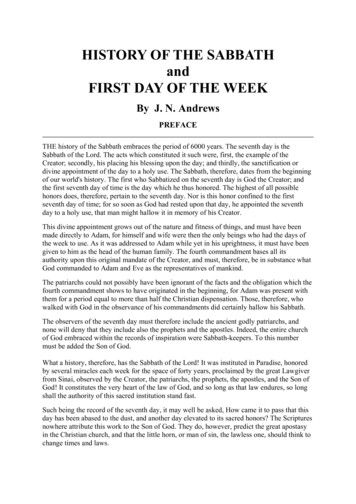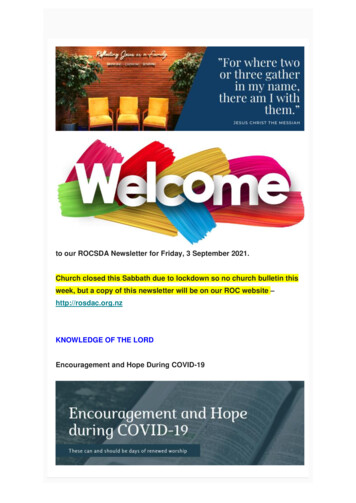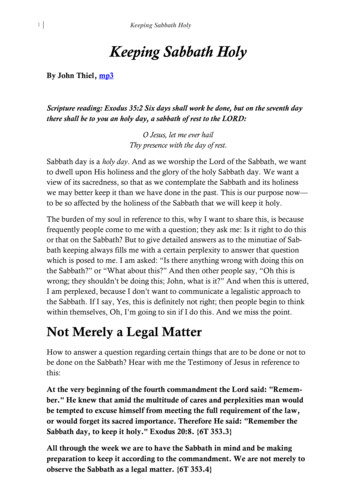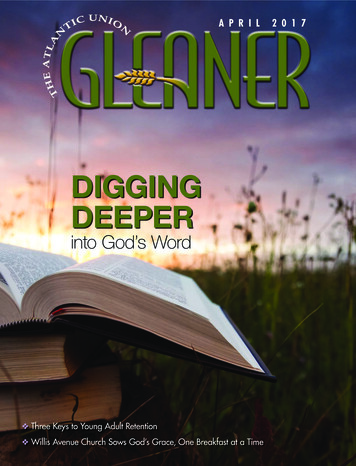
Transcription
HISTORY OF THE SABBATHandFIRST DAY OF THE WEEKBy J. N. AndrewsPREFACETHE history of the Sabbath embraces the period of 6000 years. The seventh day is theSabbath of the Lord. The acts which constituted it such were, first, the example of theCreator; secondly, his placing his blessing upon the day; and thirdly, the sanctification ordivine appointment of the day to a holy use. The Sabbath, therefore, dates from the beginningof our world's history. The first who Sabbatized on the seventh day is God the Creator; andthe first seventh day of time is the day which he thus honored. The highest of all possiblehonors does, therefore, pertain to the seventh day. Nor is this honor confined to the firstseventh day of time; for so soon as God had rested upon that day, he appointed the seventhday to a holy use, that man might hallow it in memory of his Creator.This divine appointment grows out of the nature and fitness of things, and must have beenmade directly to Adam, for himself and wife were then the only beings who had the days ofthe week to use. As it was addressed to Adam while yet in his uprightness, it must have beengiven to him as the head of the human family. The fourth commandment bases all itsauthority upon this original mandate of the Creator, and must, therefore, be in substance whatGod commanded to Adam and Eve as the representatives of mankind.The patriarchs could not possibly have been ignorant of the facts and the obligation which thefourth commandment shows to have originated in the beginning, for Adam was present withthem for a period equal to more than half the Christian dispensation. Those, therefore, whowalked with God in the observance of his commandments did certainly hallow his Sabbath.The observers of the seventh day must therefore include the ancient godly patriarchs, andnone will deny that they include also the prophets and the apostles. Indeed, the entire churchof God embraced within the records of inspiration were Sabbath-keepers. To this numbermust be added the Son of God.What a history, therefore, has the Sabbath of the Lord! It was instituted in Paradise, honoredby several miracles each week for the space of forty years, proclaimed by the great Lawgiverfrom Sinai, observed by the Creator, the patriarchs, the prophets, the apostles, and the Son ofGod! It constitutes the very heart of the law of God, and so long as that law endures, so longshall the authority of this sacred institution stand fast.Such being the record of the seventh day, it may well be asked, How came it to pass that thisday has been abased to the dust, and another day elevated to its sacred honors? The Scripturesnowhere attribute this work to the Son of God. They do, however, predict the great apostasyin the Christian church, and that the little horn, or man of sin, the lawless one, should think tochange times and laws.
History of the Sabbath by J.N AndrewsIt is the object of the present volume to show, 1. The Bible record of the Sabbath; 2. Therecord of the Sabbath in secular history; 3. The record of the Sunday festival, and of theseveral steps by which it has usurped the place of the ancient Sabbath.The writer has attempted to ascertain the exact truth in the case by consulting the originalauthorities as far as it has been possible to gain access to them. The margin will show towhom he is mainly indebted for the facts presented in this work, though it indicates only avery small part of the works consulted. He has given the exact words of the historians, andhas endeavored, conscientiously, to present them in such a light as to do justice to the authorsquoted.It is not the fault of the writer that the history of the Sunday festival presents such an array offrauds and of iniquities in its support. These are, in the nature of the case, essential to its veryexistence, for the claim of a usurper is necessarily based in fraud. The responsibility for theserests with those who dare commit or uphold such acts. The ancient Sabbath of the Lord hasnever needed help of this kind, and never has its record been stained by fraud or falsehood.Battle Creek, Mich., Nov. 18,1873 J. N. A.2
Chapter One – The CreationHISTORY OF THE SABBATHPART I - BIBLE HISTORYCHAPTER I - THE CREATIONTime and eternity - The Creator and his work - Events of the first day of time - Of thesecond - Of the third - Of the fourth - Of the fifth - Of the sixth.TIME, as distinguished from eternity, may be defined as that part of duration which ismeasured by the Bible. From the earliest date in the book of Genesis to the resurrection of theunjust at the end of the millennium, the period of about 7000 years is measured off.1 Beforethe commencement of this great week of time, duration without beginning fills the past; and atthe expiration of this period, unending duration opens before the people of God. Eternity isthat word which embraces duration without beginning and without end. And that Being whoseexistence comprehends eternity, is he who only hath immortality, the King eternal, immortal,invisible, the only wise God.2When it pleased this infinite Being, he gave existence to our earth. Out of nothing Godcreated all things;3 "so that things which are seen were not made of things which do appear."This act of creation is that event which marks the commencement of the first week of time.He who could accomplish the whole work with one word chose rather to employ six days, andto accomplish the result by successive steps. Let us trace the footsteps of the Creator from thetime when he laid the foundation of the earth until the close of the sixth day, when theheavens and the earth were finished, "and God saw everything that he had made, and behold,it was very good."4On the first day of time God created the heaven and the earth. The earth thus called intoexistence was without form, and void; and total darkness covered the Creator's work. Then"God said, Let there be light; and there was light." " And God divided the light from thedarkness," and called the one day, and other night.5On the second day of time "God said, Let there be a firmament [margin, Heb., expansion] inthe midst of the waters, and let it divide the waters from the waters." The dry land had not yetappeared; consequently the earth was covered with water. As no atmosphere existed, thickvapors rested upon the the face of the water; but the atmosphere being now called intoexistence by the word of the Creator, causing those elements to unite which compose the airwe breathe, the fogs and vapors that had rested upon the bosom of the water were borne aloftby it. This atmosphere or expansion is called heaven.6On the third day of time God gathered the waters together and caused the dry land to appear.the gathering together of the waters God called seas; the dry land, thus rescued from thewaters, he called earth. "And God said, Let the earth bring forth grass, the herb yielding seed,and fruit-tree yielding fruit after his kind, whose seed is in itself, upon the earth: and it wasso." "And God saw that it was good."73
History of the Sabbath by J.N AndrewsOn the fourth day of time "God said, Let there be lights in the firmament of the heaven, todivide the day from the night; and let them be for signs, and for seasons, and for days, andyears." "And God made two great lights; the greater light to rule the day, and the lesser lightto rule the night; he made the stars also." Light had been created on the first day of the week;and now on the fourth day he causes the sun and moon to appear as light-bearers, and placesthe light under their rule. And they continue unto this day according to his ordinances, for allare his servants. Such was the work of the fourth day. And the Great Architect, surveyingwhat he had wrought, pronounced it good.8On the fifth day of time "God created great whales, and every living creature that moveth,which the waters brought forth abundantly, after their kind, and every winged fowl after hiskind: and God saw that it was good."9On the sixth day of time "God made the beast of the earth after his kind, and cattle after theirkind, and everything that creepeth upon the earth after his kind: and God saw that it wasgood." Thus the earth, having been fitted for the purpose, was filled with every order of livingcreature, while the air and waters teemed with animal existence. To complete this noble workof creation, God next provides a ruler, the representative of himself, and places all insubjection under him. "And God said, Let us make man in our image, after our likeness: andlet them have dominion over the fish of the sea, and over the fowl of the air, and over thecattle, and over all the earth, and over every creeping thing that creepeth upon the earth.""And the Lord God formed man of the dust of the ground, and breathed into his nostrils thebreath of life; and man became a living soul. And the Lord God planted a garden eastward inEden; and there he put the man whom he had formed. And out of the ground made the LordGod to grow every tree that is pleasant to the sight, and good for food; the tree of life also inthe midst of the garden, and the tree of knowledge of good and evil." Last of all, God createdEve, the mother of all living. The work of the Creator was now complete. "The heavens andthe earth were finished, and all the host of them." "And God saw everything that he had made,and behold, it was very good." Adam and Eve were in paradise; the tree of life bloomed onearth; sin had not entered our world, and death was not here, for there was no sin. "Themorning stars sang together, and all the sons of God shouted for joy." Thus ended the sixthday.101For the scriptural and traditional evidence on this point, see Shimeall's Bible Chronology,part i. chap. vi; Taylor's Voice of the Church, pp. 25-30; and Bliss' Sacred Chronology, pp.199-203.2Isa.57:15; 1Sam.15:29, margin; Jer.10:10, margin; Micah 5:2, margin; 1Tim.6:16; 1:17;Ps.90:2.3Dr. Adam Clarke, in his Commentary on Gen.1:1, uses the following language: "[Created]Caused that to exist which previously to this moment, had no being. The rabbis, who arelegitimate judges in a case of verbal criticism on their own language, are unanimous inasserting that word bara, expresses the commencement of the existence of a thing: or itsegression from nonentity to entity . . . . These words should be translated: God in thebeginning created the substance of the heavens and the substance of the earth; i.e., the primamateria, or first elements, out of which the heavens and the earth were successively formed.' "Purchase's Pilgrimage, b. i. chap. ii., speaks thus of the creation: "Nothing but nothing had theLord Almighty, whereof, wherewith, whereby, to build this city" [that is the world].4
Chapter One – The CreationDr. Gill says: "These are said to be created, that is, to be made out of nothing; for what preexistent matter to this chaos [of verse 2] could there be out of which they could be formed?""Creation must be the work of God, for none but an almighty power could produce somethingout of nothing." Commentary on Gen.1:1.John Calvin, in his Commentary on this chapter, thus expounds the creative act: "His meaningis, that the world was made out of nothing. Hence the folly of those is refuted who imaginethat unformed matter existed from eternity."The work of creation is thus defined in 2 Maccabees 7:28: "Look upon the heaven and theearth, and all that is therein, and consider that God made them of things that were not; and sowas mankind made likewise."That this creative act marked the commencement of the first day instead of preceding it byalmost infinite ages is thus stated in 2 Esdras 6:38: "And I said, O Lord, thou spakest from thebeginning of the creation, even the first day, and saidst thus: Let heaven and earth be made;and thy word was a perfect work."Wycliffe's translation, the earliest of the English versions, renders Gen.1:1, thus: "In the first,made God of naught heaven and earth.4Gen. 1:315Gen.1:1-5; Heb.1.6Gen.1:6-8; Job 37:18.7Gen.1:9-13; Ps.136:6; 2Pet.3:5.8Gen.1:14-19; Ps.119:91; Jer.33:25.9Gen.1:20-23.10Gen.1:24:31; 2:7-9, 18-22; 3:20; Job 38:7.5
History of the Sabbath by J.N AndrewsCHAPTER 2THE INSTITUTION OF THE SABBATHEvent of the seventh day - Why the Creator rested - Acts by which the Sabbath was made Time and order of their occurrence - Meaning of the word sanctified - The fourthcommandment refers the origin of the Sabbath to creation - The second mention of theSabbath confirms this fact - The Saviour's testimony - When did God sanctify the seventhday - Object of the Author of the Sabbath - Testimony of Josephus and of Philo - Negativeargument from the book of Genesis considered - Adam's knowledge of the Sabbath notdifficult to be known by the patriarchs.The work of the creator was finished, but the first week of time was not yet completed. Eachof the six days had been distinguished by the Creator's work upon it; but the seventh wasrendered memorable in a very different manner. "And on the seventh1 day God ended hiswork which he had made; and he rested on the seventh day from all his work which he hadmade." In yet stronger language it is written: "On the seventh day he rested, and wasREFRESHED."2Thus the seventh day of the week became the rest-day of the Lord. How remarkable is thisfact! "The everlasting God, The Lord, the Creator of the ends of the earth, fainteth not, neitheris weary."3 He needed no rest; yet it is written, "On the seventh day he rested, and wasrefreshed." Why does not the record simply state the cessation of the Creator's work? Why didhe at the close of that work employ a day in rest? The answer will be learned from the nextverse. He was laying the foundation of a divine institution, the memorial of his own greatwork."And God blessed the seventh day, and sanctified it; because that in it he hadrested from all his work which God created and made." The fourthcommandment states the same fact: He "rested the seventh day; wherefore theLord blessed the Sabbath day, and hallowed it."4The blessing and sanctification of the seventh day were because that God had rested upon it.His resting upon it, then, was to lay the foundation for blessing and sanctifying the day. Hisbeing refreshed with this rest, implies that he delighted in the act which laid the foundationfor the memorial of his great work.The second act of the Creator in instituting this memorial was to place his blessing upon theday of his rest. Thence forward it was the blessed rest-day of the Lord. A third act completesthe sacred institution. The day already blessed of God is now, last of all, sanctified orhallowed by him. To sanctify is "to separate, set apart, or appoint to a holy, sacred, orreligious use." To hallow is "to make holy; to consecrate; to set apart for a holy or religioususe."5The time when these three acts were performed is worthy of especial notice. The first act wasthat of rest. This took place on the seventh day; for the day was employed in rest. The secondand third acts took place when the seventh day was past. "God blessed the seventh day andsanctified it: because that in it he had rested from all his work." Hence it was on the first day6
Chapter Two – The Institution of the Sabbathof the second week of time that God blessed the seventh day, and set it apart to a holy use.The blessing and sanctification of the seventh day, therefore, relate not to the first seventh dayof time, but to the seventh day of the week for time to come, in memory of God's rest on thatday from the work of creation.With the beginning of time, God began to count days, giving to each an ordinal number for itsname. Seven different days receive as many different names. In memory of that which he didon the last of these days, he sets that apart by name to a holy use. This act gave existence toweeks, or periods of seven days. For with the seventh day, he ceased to count, and, by thedivine appointment of that day to a holy use in memory of his rest thereon, he causes man tobegin the count of a new week so soon as the first seventh day had ceased. And as God hasbeen pleased to give man, in all, but seven different days, and has given to each one of thesedays a name which indicates its exact place in the week, his act of setting apart one of theseby name, which act created weeks and gave man the Sabbath, can never - except by sophistry- be made to relate to an indefinite or uncertain day.The days of the week are measured off by revolution of our earth on its axis; and hence ourseventh day, as such, can come only to dwellers on this globe. To Adam and Eve, therefore,as inhabitants of this earth, and not to the inhabitants of some other world, were the days ofthe week given to use. Hence, when God set apart one of these days to a holy use in memoryof his own rest on that day of the week, the very essence of the act consisted in his tellingAdam that this day should be used only for sacred purposes. Adam was then in the garden ofGod, placed there by the Creator to dress it and to keep it. He was also commissioned of Godto subdue the earth.6 When therefore the rest-day of the Lord should return, from week toweek, all this secular employment, however proper in itself, must be laid aside, and the dayobserved in memory of the Creator's rest.Dr. Twisse quotes Martin Luther thus:"And Martin Luther professeth as much (tome vi, in Gen.2:3). It follows fromhence,' saith he, that, if Adam had stood in his innocency, yet he should havekept the seventh day holy, that is, on that day he should have taught hischildren, and children's children, what was the will of God, and wherein hisworship did consist; he should have praised God, given thanks, and offered.On other days he should have tilled his ground, looked to his cattle.' "7The Hebrew verb, kadash, here rendered sanctified, and in the fourth commandment renderedhallowed, is defined by Gesenius, "To pronounce holy, to sanctify; to institute any holy thing,to appoint."8 It is repeatedly used in the Old Testament for a public appointment orproclamation. Thus, when the cities of refuge were set apart in Israel, it is written: "Theyappointed [margin, Heb., sanctified] Kedesh in Galilee in Mount Naphtali, and Shechem inMount Ephraim," &c. This sanctification or appointment of the cities of refuge was by apublic announcement to Israel that these cities were set apart for that purpose. This verb isalso used for the appointment of a public fast, and for the gathering of a solemn assembly.Thus it is written: "Sanctify [i.e., appoint] ye a fast, call a solemn assembly, gather the eldersand all the inhabitants of the land into the house of the Lord your God." "Blow the trumpet inZion, sanctify [i.e., appoint] a fast, call a solemn assembly." "And Jehu said, Proclaim[margin, Heb., sanctify] a solemn assembly for Baal."9 This appointment for Baal was sopublic that all the worshipers of Baal in all Israel were gathered together. These fasts andsolemn assemblies were sanctified or set apart by a public appointment or proclamation of thefact. When therefore God set apart the seventh day to a holy use, it was necessary that he7
History of the Sabbath by J.N Andrewsshould state that fact to those who had the days of the week to use. Without suchannouncement the day could not be set apart from the others.But the most striking illustration of the meaning of this word may be found in the record ofthe sanctification of Mount Sinai.10 When God was about to speak the ten commandments inthe hearing of all Israel, he sent Moses down from the top of Mount Sinai to restrain thepeople from touching the mount. "And Moses said unto the Lord, The people cannot come upto Mount Sinai; for thou chargedst us, saying, Set bounds about the mount, and sanctify it."Turning back to the verse where God gave this charge to Moses, we read: "And thou shalt setbounds unto the people round about, saying, Take heed to yourselves, that ye go not up intothe mount or touch the border of it." Hence to sanctify the mount was to command the peoplenot to touch even the border of it; for God was about to descend in majesty upon it. In otherwords, to sanctify or set apart to a holy use Mount Sinai, was to tell the people that Godwould have them treat the mountain as sacred to himself. And thus also to sanctify the restday of the Lord was to tell Adam that he should treat the day as holy to the Lord.The declaration, "God blessed the seventh day, and sanctified it," is not indeed acommandment for the observance of that day; but it is the record that such a precept wasgiven to Adam.11 For how could the Creator "set apart to a holy use" the day of his rest, whenthose who were to use the day knew nothing of his will in the case? Let those answer who areable.This view of the record in Genesis we shall find to be sustained by all the testimony in theBible relative to the rest-day of the Lord. The facts which we have examined are the basis ofthe fourth commandment. Thus spake the great Law-giver from the summit of the flamingmount: "Remember the Sabbath day, to keep it holy." "The seventh day is the Sabbath of theLord thy God." "For in six days the Lord made heaven and earth, the sea, and all that in themis, and rested the seventh day: wherefore the Lord blessed the Sabbath day, and hallowedit."12The term Sabbath is transferred from the Hebrew language, and signifies rest.13 Thecommand, "Remember the Sabbath day, to keep it holy," is therefore exactly equivalent tosaying, "Remember the rest-day, to keep it holy." The explanation which follows sustains thisstatement: "The seventh day is the Sabbath [or rest-day] of the Lord thy God." The origin ofthis rest-day is given in these words: "For in six days the Lord made heaven and earth, the sea,and all that in them is, and rested the seventh day: wherefore the Lord blessed the Sabbathday, and hallowed it." That which is enjoined in the fourth commandment is to keep holy therest-day of the Lord. And this is defined to be the day on which he rested from the work ofcreation. Moreover, the fourth commandment calls the seventh day the Sabbath day at thetime when God blessed and hallowed that day; therefore the Sabbath is an institution datingfrom the foundation of the world. The fourth commandment points back to the creation for theorigin of its obligation; and when we go back to that point, we find the substance of the fourthcommandment given to Adam: "God blessed the seventh day, and sanctified it;" i.e., set itapart to a holy use. And in the commandment itself, the same fact is stated: "The Lord blessedthe Sabbath day, and hallowed it;" i.e., appointed it to a holy use. The one statement affirmsthat "God blessed the seventh day, and sanctified it;" the other, that "the Lord blessed theSabbath day, and hallowed it." These two statements refer to the same acts. Because the wordSabbath does not occur in the first statement, it has been contended that the Sabbath did notoriginate at creation, it being the seventh day merely which was hallowed. From the secondstatement, it has been contended that God did not bless the seventh day at all, but simply theSabbath institution. But both statements embody all the truth. God blessed the seventh day,8
Chapter Two – The Institution of the Sabbathand sanctified it; and this day thus blessed and hallowed was his holy Sabbath, or rest-day.Thus the fourth commandment establishes the origin of the Sabbath at creation.The second mention of the Sabbath in the Bible furnishes a decisive confirmation of thetestimonies already adduced. On the sixth day of the week, Moses, in the wilderness of Sin,said to Israel, "To-morrow is the rest of the holy Sabbath unto the Lord."14 What had beendone to the seventh day since God blessed and sanctified it as his rest-day in paradise?Nothing. What did Moses do to the seventh day to make it the rest of the holy Sabbath untothe Lord? Nothing. Moses on the sixth day simply states the fact that the morrow is the rest ofthe holy Sabbath unto the Lord. The seventh day had been such ever since God blessed andhallowed the day of his rest.The testimony of our divine Lord relative to the origin and design of the Sabbath is ofpeculiar importance. He is competent to testify, for he was with the father in the beginning ofthe creation.15 "The Sabbath was made for man," said he, "not man for the Sabbath."16 Thefollowing grammatical rule is worthy of notice: "A noun without an adjective is invariablytaken in its broadest extension, as: Man is accountable."17 The following texts will illustratethis rule, and also this statement of our Lord's: "Man lieth down and riseth not: till theheavens be no more, they shall not awake, nor be raised out of their sleep." There hath notemptation taken you but such as is common to man." "It is appointed unto men once todie."18 In these texts man is used without restriction, and, therefore, all mankind arenecessarily intended. The Sabbath was therefore made for the whole human family, andconsequently originated with mankind. But the Saviour's language is even yet more emphaticin the original: "The Sabbath was made for THE man, not THE man for the Sabbath." Thislanguage fixes the mind on the man Adam, who was made of the dust of the ground justbefore the Sabbath was made for him, of the seventh day.This is a striking confirmation of the fact already pointed out that the Sabbath was given toAdam, the head of the human family."The seventh day is the Sabbath of the Lord thy God; yet he made the Sabbathfor man. "God made the Sabbath his by solemn appropriation, that he mightconvey it back to us under the guarantee of a divine charter, that none mightrob us of it with impunity."But is it not possible that God's act of blessing and sanctifying the seventh day did not occurat the close of creation week? May it not be mentioned then because God designed that theday of his rest should be afterward observed? Or rather, as Moses wrote the book of Genesislong after the creation, might he not insert this account of the sanctification of the seventh daywith the record of the first week, though the day itself was sanctified in his own time?It is very certain that such an interpretation of the record cannot be admitted, unless the factsin the case demand it. For it is, to say the least, a forced explanation of the language. Therecord in Genesis, unless this be an exception, is a plain narrative of events. Thus what Goddid on each day is recorded in its order down to the seventh. It is certainly doing violence tothe narrative to affirm that the record respecting the seventh day is of a different characterfrom that respecting the other six. He rested the seventh day; he sanctified the seventh daybecause he had rested upon it. The reason why he should sanctify the seventh day existedwhen his rest was closed. To say, therefore, that God did not sanctify the day at that time, butdid it in the days of Moses, is not only to distort the narrative, but to affirm that he neglectedto do that for which the reason existed at creation, until twenty-five hundred years after.199
History of the Sabbath by J.N AndrewsBut we ask that the facts be brought forward which prove that the Sabbath was sanctified inthe wilderness of Sin, and not at creation. And what are the facts that show this? It isconfessed that such facts are not upon record. Their existence is assumed in order to sustainthe theory that the Sabbath originated at the fall of the manna, and not in paradise.Did God sanctify the Sabbath in the wilderness of Sin? There is no intimation of such fact. Onthe contrary, it is mentioned at that time as something already set apart of God. On the sixthday Moses said, "To-morrow is the rest of the holy Sabbath unto the Lord." 20 Surely this isnot the act of instituting the Sabbath, but the familiar mention of an existing fact. We pass onto Mount Sinai. Did God sanctify the Sabbath when he spoke the ten commandments? No oneclaims that he did. It is admitted by all that Moses spoke of it familiarly the previous month.21Does the Lord at Sinai speak of the sanctification of the Sabbath? He does; but in the verylanguage of Genesis he goes back for the sanctification of the Sabbath, not to the wildernessof Sin, but to the creation of the world.22 We ask those who hold the theory underexamination, this question: If the Sabbath was not sanctified at creation, but was sanctified inthe wilderness of Sin, why does the narrative in each instance23 record the sanctification ofthe Sabbath at creation and omit all mention of such fact in the wilderness of Sin? Nay, whydoes the record of events in the wilderness of Sin, show that the holy Sabbath was at that timealready in existence? In a word, How can a theory subversive of all the facts in the record, bemaintained as the truth of God?We have seen the Sabbath ordained of God at the close of the creation week. The object of itsAuthor is worthy of especial attention. Why did the Creator set up this memorial in paradise?Why did he set apart from the other days of the week that day which he had employed in rest?"Because that in it," says the record, "he had rested from all his work which God created andmade." A rest necessarily implies a work performed. And hence the Sabbath was ordained ofGod as a memorial of the work of creation. And therefore that precept of the moral law whichrelates to this memorial, unlike every other precept of that law, begins with the word,"Remember." The importance of this memorial will be appreciated when we learn from theScriptures that it is the work of creation which is claimed by its Author as the great evidenceof his eternal power and Godhead, and as that great fact which distinguishes him from allfalse gods. Thus it is written:"He that built all things is God." "The gods that have not made the heavens andthe earth, even they shall perish from the earth, and from under these heavens.""But the Lord is the true God, he is the living God, and an
It is the object of the present volume to show, 1. The Bible record of the Sabbath; 2. The record of the Sabbath in secular history; 3. The record of the Sunday festival, and of the several steps by which it has usurped the place of the ancient Sabbath. The writer has attempted to ascerta










